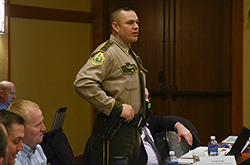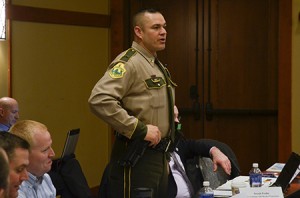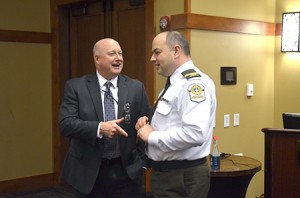

copyright the Chronicle December 3, 2014
by Joseph Gresser
JAY — A bus taking U.S. Senator Patrick Leahy and Vermont Governor Peter Shumlin to a meeting in Quebec is rammed by a man who committed a robbery in Vermont and escaped by speeding through Canadian customs.
Governor Shumlin is severely injured, the robber and Vermont State Police troopers, acting as security for the Governor, exchange gunfire. One trooper is wounded, and the robber is killed. The incident ends as the Governor is airlifted to the University of Vermont Medical Center.
That tangled tale, as laid out by Vermont State Police Lieutenant Michael Manning, was the starting point for an exercise that brought law enforcement personnel from both sides of the border together at Jay Peak on Monday and Tuesday.
The two-day Quebec-Vermont Cross Border Workshop, the fourth in a series of annual events, was meant to help members of the Vermont State Police and the Sûreté du Quebec, their Canadian counterparts, find ways to work together in a relaxed atmosphere rather than in an emergency.
This year’s session was hosted by State Police Lieutenant Manning, who serves as chief of Homeland Security at the state Division of Emergency Management and Homeland Security. The event is held in Quebec one year and Vermont the next, he said.
The session was intended to help participants learn to work with federal officials as well as with each other. To that end, representatives of the U.S. Border Patrol, Royal Canadian Mounted Police (RCMP), and the Canadian Border Services Agency (CBSA) participated in the program. Representatives from the New York and Maine State Police forces also attended as observers.
“We’re focused on finding ways to increase cooperation and increase collaboration,” Lieutenant Manning explained. “We’re focused on eliminating the border as a barrier to our efforts.”
Lieutenant Daniel Campagna, who commands the Granite County outpost of the Sûreté du Quebec, agreed with his Vermont colleague.
“We have a continuous crime that starts in the U.S.A. with a robbery,” Lieutenant Campagna said. “We are involved since he does not stop for the border, that is my problem. The robber has run the port — escaped the port of entry without legal admission to Canada.”
“The Vermont State Police, technically, should stop at the border,” he continued. “They are not police officers in Quebec.”
In this case, though, the Vermont police are already involved because the robber has hit the bus and fired on them.
“Someone died, shot by Vermont police in Quebec. It’s a big mess. What do we do now?” Lieutenant Campagna asked.
“That’s what we are discussing here. Sometimes we agree, sometimes, we don’t.”

One answer, Lieutenant Campagna suggested, is to form a joint team that will share evidence and issue statements together.
Many police forces are jealous of their territory and resent any outside influence, or even help, he admitted.
“Honestly, the Vermont State Police and we do not have this philosophy,” Lieutenant Campagna said. “We have exactly the philosophy of a partnership. I don’t think the Vermont State Police or the Sûreté du Quebec want to be king of the world. That’s what we’re trying to fight.”
He said the culture of firefighters calls for extensive practice before heading out to battle a blaze. Police generally do not have that attitude, “but today, we prepare,” he said.
That preparation involved considerable discussion of the scenario between three groups carved out of the 30 men who participated in the workshop.
Brittany Marquette, the exercise planner from the state Department of Public Safety, called on people to discuss what they learned.
Looking at the frontier-straddling situation, Chief Bradley Curtis of the Border Patrol summed up his conclusion in a few terse words.
“What has to be done has to be done. Let the lawyers worry about it,” he said.
Luke Bury, a supervisor with the CBSA said he would like to see dispatchers more involved in the planning. Much of the information provided to officers will come through the dispatchers, and the more they know the better prepared officers will be.
Mr. Bury recalled a recent incident when a woman accused of robbery ran the border when children were headed for school. While schools on the U.S. side of the border were locked down, the Canadians did not have the same information as their Vermont colleagues and schools ran as usual, he said.
Language was not a big impediment to cooperation, said Lieutenant Marc Robert of the Sûreté du Quebec. Although his officers work in French among themselves, they found it easy enough to switch over to English when Vermonters became involved, he said.
“For someone who doesn’t work along the border, this could be complicated,” said Vermont State Police Captain Paul White. Those who are familiar with the area do not find it as difficult, he added.
One officer who works close to the border on a daily basis is Lieutenant Walter Smith, who commands the Derby State Police barracks. He said he values the conversations fostered by the exercise and hopes to see them continue.
“Don’t stop the conversation,” agreed Lieutenant Robert.
One outsider, Sergeant Carlton Small, of the Maine State Police liked what he saw as an observer. Noting his state’s long border with Quebec and New Brunswick, Sergeant Small said he hopes to establish a similar program when he gets back home.
Lieutenant Manning sent participants home with a few final words.
“I hope we won’t have a bus crash with a Senator and Governor any time soon.”
contact Joseph Gresser at [email protected]
For more free articles from the Chronicle like this one, see our Editor’s Picks pages. For all the Chronicle’s stories, subscribe:
Print subscription
Annual online subscription
Short-term online subscription







